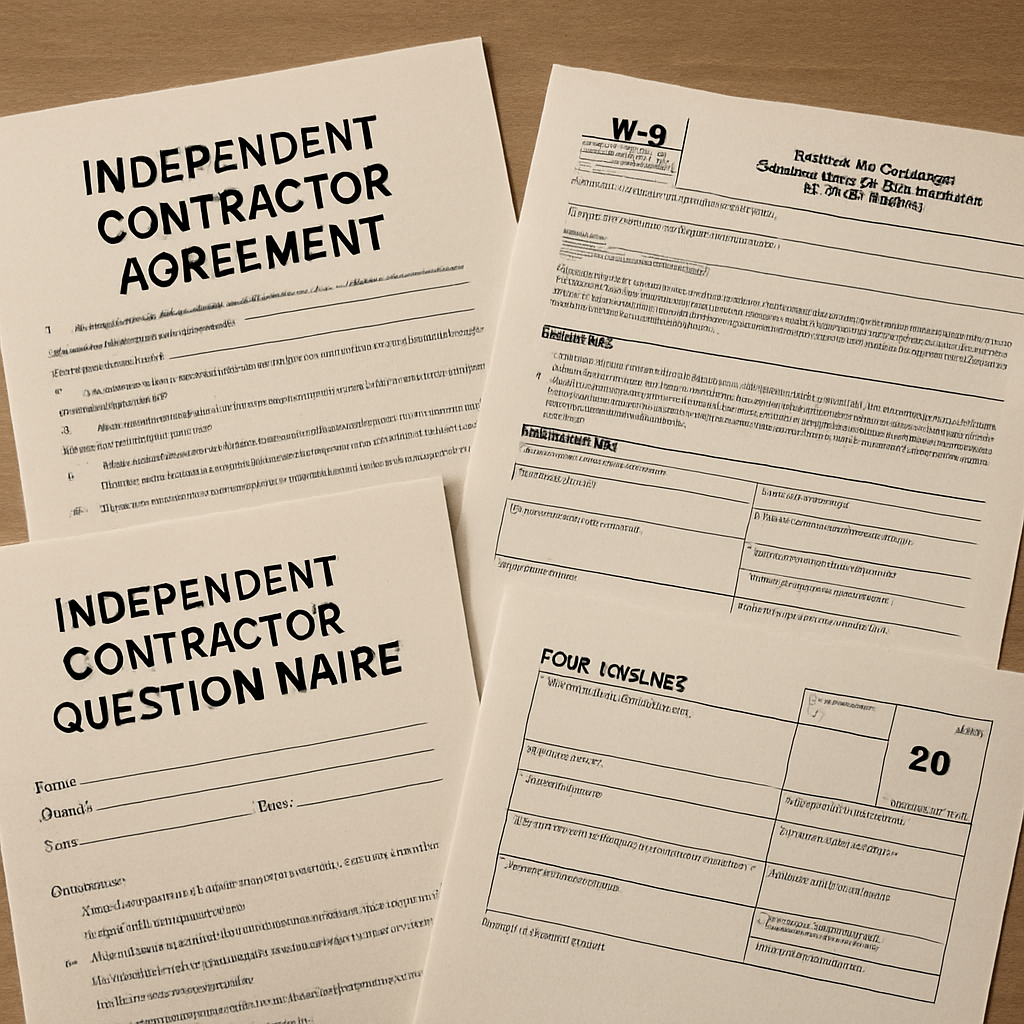Navigating the World of Independent Caregivers

An independent caregiver is a self-employed individual who offers personal care services to clients in need. Unlike caregivers employed by agencies, independent caregivers work directly for the families they serve. This arrangement offers flexibility, both for the caregiver and the family, but also comes with additional responsibilities.
Defining the Scope of Work
Independent caregivers are responsible for a variety of tasks, including:
- Assisting with daily living activities such as bathing, dressing, and eating
- Providing companionship and emotional support
- Managing medication schedules
- Performing light housekeeping and meal preparation
- Coordinating with healthcare providers
Each client's needs can vary significantly, so it's essential to clearly define your services in a contract. This ensures both parties have aligned expectations and can prevent misunderstandings.
The Importance of Building Trust
Trust is foundational in the caregiver-client relationship. As an independent caregiver, establishing trust involves demonstrating reliability, maintaining confidentiality, and showing genuine compassion. Regular communication with both the client and their family is crucial for building a strong, trusting relationship.
Balancing Professionalism and Personal Connection
While it's important to remain professional, developing a personal connection with your clients can enhance the caregiving experience. This connection helps in understanding the unique preferences and personalities of each client, allowing for more tailored and effective care.
Becoming an Independent Contractor Caregiver
The process of becoming an independent caregiver involves several steps. Understanding these steps will help you transition smoothly into this role.
Required Skills and Qualifications
While there are no formal educational requirements, having a background in healthcare or a related field is beneficial. Key skills include:
- Strong communication and interpersonal skills
- Patience and empathy
- Basic medical knowledge
- Time management and organizational skills
Developing these skills can involve participating in workshops or courses, volunteering in healthcare settings, or seeking mentorship from experienced caregivers. Continuous learning is crucial to adapt to the evolving demands of caregiving.
Certification and Training
Consider obtaining certifications like CPR and First Aid to enhance your qualifications. Additionally, some states require specific caregiver training, so it's essential to check local regulations.
Investing in specialized training programs can set you apart from other caregivers. This could include learning about dementia care, understanding mobility aids, or managing chronic illnesses, which broadens the scope of clients you can effectively serve.
Setting Up as an Independent Contractor

To operate as an independent contractor, you must:
- Register as a Business: Depending on your location, you may need to register your services as a business entity.
- Obtain an EIN: An Employer Identification Number (EIN) from the IRS is necessary for tax purposes.
- Create a Service Agreement: Draft a contract outlining the terms of service, rates, and responsibilities.
- Insurance: Consider liability insurance to protect yourself and your clients.
Understanding the legalities of setting up a business is crucial. Consulting with a business advisor or a lawyer can provide guidance on local requirements, helping you avoid potential pitfalls.
Managing Finances: Reporting and Tax Obligations
Managing finances as an independent caregiver involves understanding your tax obligations and reporting income accurately.
How to Report Caregiver Income
All income earned as an independent caregiver must be reported to the government. Here's how to ensure compliance:
- Keep Accurate Records: Maintain detailed records of all earnings, expenses, and invoices.
- Use Form 1040: Report income using IRS Form 1040, and Schedule C to detail profits and losses.
- Pay Estimated Taxes: If you expect to owe more than $1,000 in taxes, you must make quarterly estimated tax payments.
Utilizing accounting software can simplify financial management, ensuring you stay organized and compliant. It's also beneficial to consult with a tax professional who can help you understand the complexities of self-employment taxes.
Navigating Deductions and Credits
As an independent caregiver, you may be eligible for various tax deductions and credits. These can include deductions for home office use, travel expenses, or continuing education. Understanding these can significantly impact your net earnings.
Familiarize yourself with these deductions and keep detailed records to substantiate any claims. This proactive approach can lead to substantial tax savings.
Is Family Caregiver Income Taxable?
Family caregivers often wonder if their income is taxable. Generally, any payment received for caregiving services is considered taxable income. However, specific tax deductions and credits may apply, so consulting a tax professional is advisable.
Understanding the nuances of taxable income, especially when caring for family members, can prevent unexpected tax liabilities. A tax professional can also help identify any potential benefits you may be eligible for, such as caregiver credits.
Legal Considerations: Paying Caregivers Under the Table
Paying caregivers "under the table" can lead to significant legal issues. It's vital to understand the ramifications:
Legal Risks and Consequences
This practice is illegal and can result in fines and penalties. Avoiding these consequences requires adhering to all employment laws and ensuring proper documentation of payments and taxes.
Lack of Protection for Caregivers
Without formal employment, caregivers lack access to benefits and protections such as workers' compensation. This can leave both the caregiver and the employer vulnerable to legal and financial risks.
Ensuring Compliance
To avoid these issues, ensure all payments are documented and taxes are appropriately withheld and reported. Consulting with a legal professional or accountant can provide clarity on your obligations and help establish compliant practices.
Finding Independent Contractor Caregiver Jobs

by Neakasa (https://unsplash.com/@neakasa)
Finding clients as an independent caregiver can be daunting, but several strategies can aid in your search:
Networking and Referrals
Building a network within your community can be invaluable. Attend local events, join caregiver support groups, and connect with healthcare professionals to gain referrals.
Engaging with local senior centers or community health fairs can also be effective in expanding your network. Offering free workshops or informational sessions can position you as a knowledgeable and trusted professional in the caregiving field.
Online Job Platforms
Several websites cater specifically to caregiver job listings, such as:
- Care.com
- Indeed
- Craigslist
Ensure your profiles on these platforms are complete and professional to attract potential clients. Regularly updating your profile with new skills or certifications can also keep you competitive in the job market.
Utilizing Social Media
Social media platforms can be powerful tools for reaching potential clients. Creating professional profiles on LinkedIn, Facebook, or Instagram can help showcase your expertise and connect you with families in need of caregiving services.
The Benefits and Challenges of Freelance Caregiving
Being an independent caregiver offers unique advantages and challenges.
Benefits
- Flexibility: Set your own schedule and choose your clients.
- Direct Payment: Earn more by eliminating agency fees.
- Personal Relationships: Build closer bonds with clients and their families.
The autonomy of setting your own rates and working conditions can lead to greater job satisfaction. Tailoring your services to fit your personal strengths and preferences can enhance both your and your clients' experiences.
Challenges
- Inconsistent Income: Work can be sporadic, leading to financial instability.
- Administrative Tasks: Managing taxes, contracts, and other administrative duties can be time-consuming.
- Limited Benefits: Lack of health insurance, paid leave, and retirement plans.
Navigating these challenges requires strategic planning and a proactive approach. Establishing a financial cushion and exploring supplemental income opportunities can mitigate the risks of income inconsistency.
Conclusion: Is Independent Caregiving Right for You?
Independent caregiving is a fulfilling career path for those who enjoy helping others and value flexibility. However, it requires a proactive approach to managing both the caregiving and business aspects. By understanding the responsibilities, legalities, and financial considerations, you can navigate this profession successfully and make a positive impact on the lives of those you care for.
As you embark on this journey, remember that preparation and ongoing education are key. Stay informed about industry changes, continually hone your skills, and maintain a professional approach to ensure long-term success as an independent caregiver.
Preparing for Long-Term Success
Continually assess and adapt your business strategy to stay competitive. This includes staying updated on industry trends, seeking feedback from clients, and investing in personal development.
Embracing a Supportive Community
Connect with other caregivers to share experiences and advice. Building a supportive network can provide encouragement, resources, and opportunities for collaboration.
Reflecting on Your Journey
Regularly reflect on your career path and goals. Understanding your motivations and achievements can help maintain passion and enthusiasm for your work, ensuring a fulfilling and successful career in independent caregiving.
Turn Your Compassion Into a Career — or Get Paid to Care for Family
Are you a caregiver looking for meaningful work? Or are you already caring for a loved one at home and wondering if you can get paid for the care you provide?
At InclusiveOne Home Care we offer rewarding opportunities for:
- Professional Caregivers – CNAs, HHAs, and companions who want flexible, fulfilling work helping seniors live safely and comfortably at home.
- Family Caregivers – If you're caring for a parent, grandparent, or other loved one, you may qualify to get paid through state-funded programs. We’ll guide you through the process.
- Full-Time, Part-Time, and Flexible Shifts Available
Whether you're seeking a caregiving career or already providing care for someone you love, we’re here to support you every step of the way.
Apply Now or contact us by Phone or Email to Learn More About Becoming a Paid Caregiver!
Your care makes a difference — let us help you make it a career.
[Join Our Team] [Get Paid to Care for Family]
